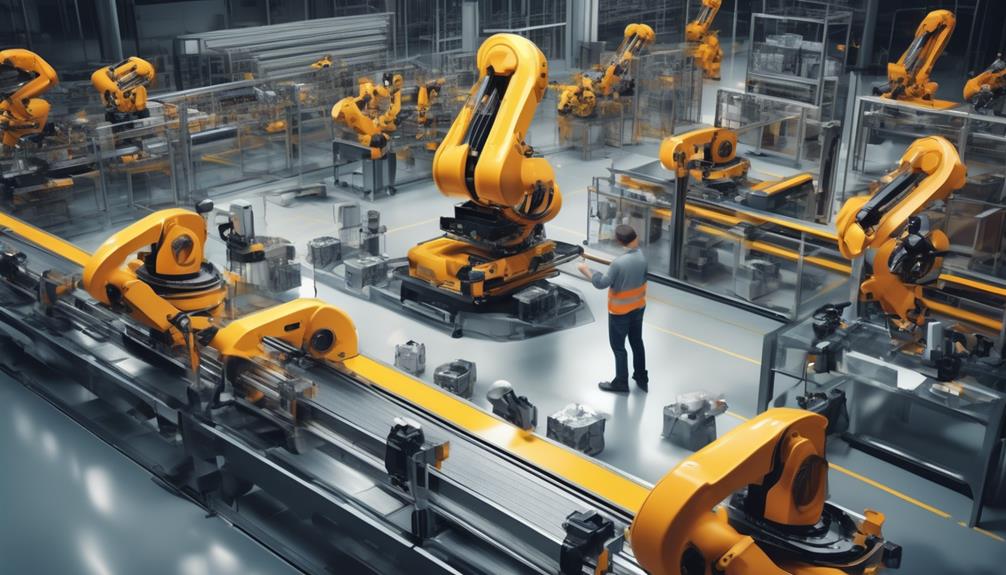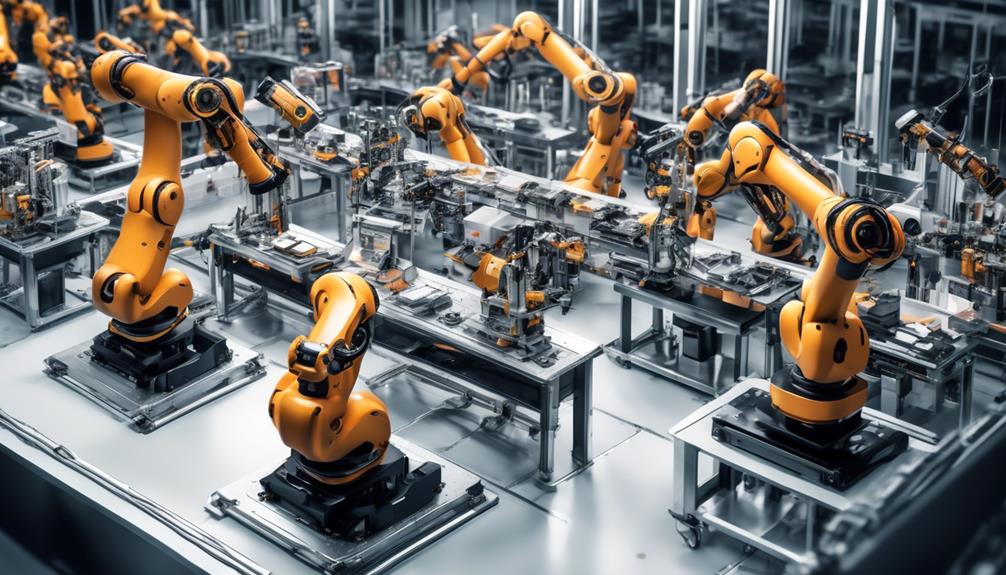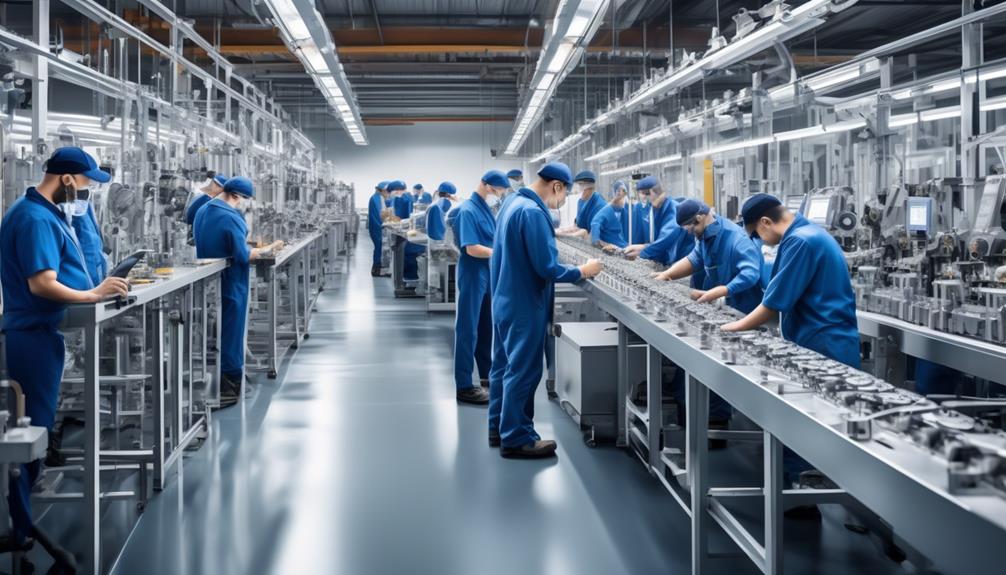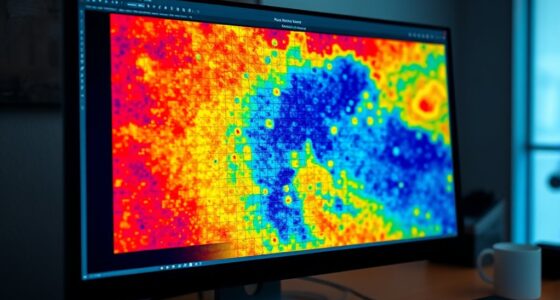The saying ‘measure twice, cut once,’ is highly important in the manufacturing sector. The introduction of automated quality control methods has transformed the way we ensure accuracy and consistency in our products.
But what exactly are these solutions, and how do they impact the manufacturing landscape?
Let's explore the intricate web of technology, efficiency, and quality that these automated systems bring to the table, and how they are reshaping the future of manufacturing as we know it.
Key Takeaways
- Automated quality control plays a crucial role in modern manufacturing by identifying and addressing defects early in the production process, enhancing product quality, and increasing throughput.
- The integration of advanced technology in quality control systems reshapes traditional manufacturing paradigms and improves overall product quality and reliability.
- Modern QC technology, including sensors, cameras, machine learning algorithms, and data analytics tools, enables real-time monitoring and analysis of production processes, contributing to lean manufacturing principles and reducing waste.
- Automated quality control systems not only improve quality and customer satisfaction but also have an impact on employment and job evolution, requiring the redefinition of job roles and creating new opportunities in technology and maintenance.
Importance of Automated Quality Control
Automated quality control plays a crucial role in modern manufacturing, ensuring that defects are identified and addressed early in the production process. Manufacturers rely on automated quality control solutions to improve their production processes. These technologies not only enhance product quality but also increase throughput.
By automating inspections, manufacturers eliminate human error, enabling high rates of inspection across various applications. The implementation of automated quality control systems leads to improved accuracy, reduced human errors, and cost savings. These systems detect issues before they escalate, ensuring high-quality products while reducing quality control costs.
Additionally, automation improves inspection measurement reliability, captures more data, and provides real-time reviews for better decision-making. Manufacturers understand that automated quality control is essential in today's manufacturing landscape, as it not only ensures high-quality products but also enhances efficiency and reduces costs.
Incorporating automated quality control solutions into manufacturing processes is a strategic move that aligns with the industry's increasing reliance on advanced technologies to drive improvements.
Evolution of Quality Control Systems
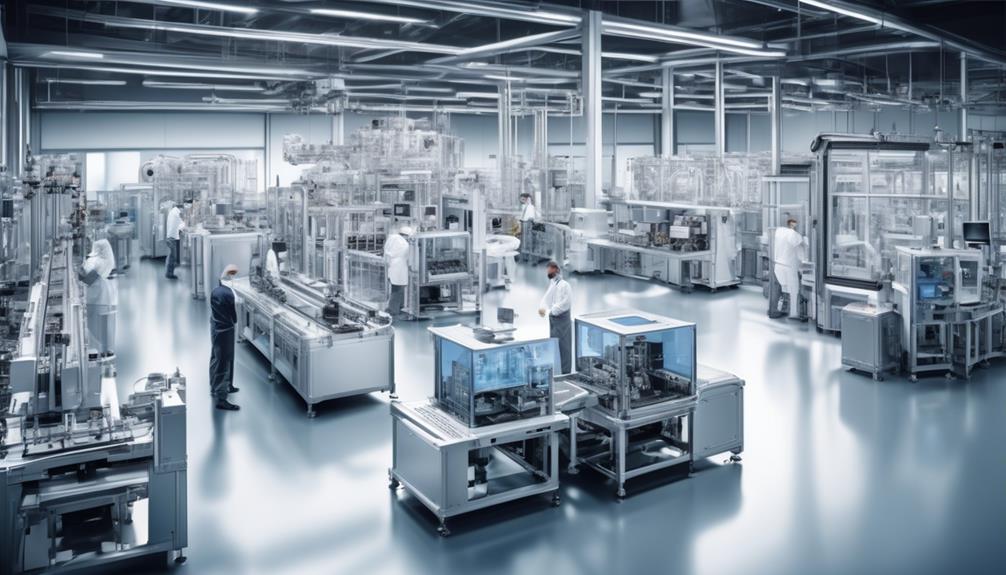
As we explore the evolution of quality control systems, it's imperative to consider the historical foundations of QC alongside the transformative impact of modern QC technology.
The progression from traditional manual inspections to automated systems reflects the continuous quest for enhanced precision and efficiency in manufacturing processes.
Understanding this evolution is crucial for grasping the current landscape and future potential of automated quality control solutions.
Historical QC Systems
In the evolution of quality control systems, the transition from manual inspections to automated, technology-driven processes has been motivated by the pursuit of precision, efficiency, and meeting customer expectations. Historical QC systems have laid the foundation for the implementation of automated quality control inspections, improving inspection measurement reliability in manufacturers' quality control operations. The progression of QC systems reflects the ongoing pursuit of impeccable product quality, reshaping traditional manufacturing paradigms through the integration of advanced technology. This evolution improves inspection processes in the manufacturing process, enhancing the overall quality and reliability of products.
| Automated Quality Control Systems | Benefits | Impact |
|---|---|---|
| Enhanced efficiency | Improves inspection measurement reliability | Streamlines operations |
| Precision | Consistent quality assurance | Meets customer expectations |
| Integration of advanced technology | Real-time data analysis | Drives continuous improvement |
Modern QC Technology
With the evolution of quality control systems, manufacturers have embraced modern QC technology to ensure unparalleled precision and efficiency in their production processes.
Automated quality control inspections have reshaped traditional manufacturing paradigms, leveraging advanced technology for impeccable product quality. These systems are designed to meticulously inspect and analyze data, allowing manufacturers to identify and rectify any deviations in the production processes promptly.
By integrating modern QC technology, manufacturers can achieve higher levels of accuracy and consistency in their products, ultimately leading to increased customer satisfaction.
The seamless integration of these modern QC systems into manufacturing processes hasn't only streamlined operations but also significantly reduced the likelihood of errors, thereby enhancing overall productivity and quality standards.
Manufacturers are increasingly recognizing the indispensable role of modern QC technology in meeting and exceeding customer expectations.
Key Components of Automation
Utilizing a combination of hardware and software components, automated quality control systems efficiently enhance the accuracy and speed of inspections in manufacturing processes. Key components of these automated systems include sensors, cameras, machine learning algorithms, and data analytics tools. These components enable the automation of quality control processes, allowing for real-time monitoring and analysis of production processes.
By integrating computer vision and machine learning algorithms, automated inspection systems can detect defects with high precision and speed, contributing to lean manufacturing principles by reducing waste and rework. Additionally, the use of Statistical Process Control (SPC) techniques is accelerated through automation, enabling continuous monitoring and analysis of production processes.
Furthermore, automated quality control systems facilitate the collection and monitoring of large volumes of production data, which can be utilized for data analytics and predictive maintenance. Complete traceability of products is ensured through automation, with the integration of barcode or RFID systems into manufacturing and supply chain processes.
These key components of automation play a crucial role in enhancing manufacturing processes and ensuring the delivery of high-quality products to the market.
Benefits in Manufacturing
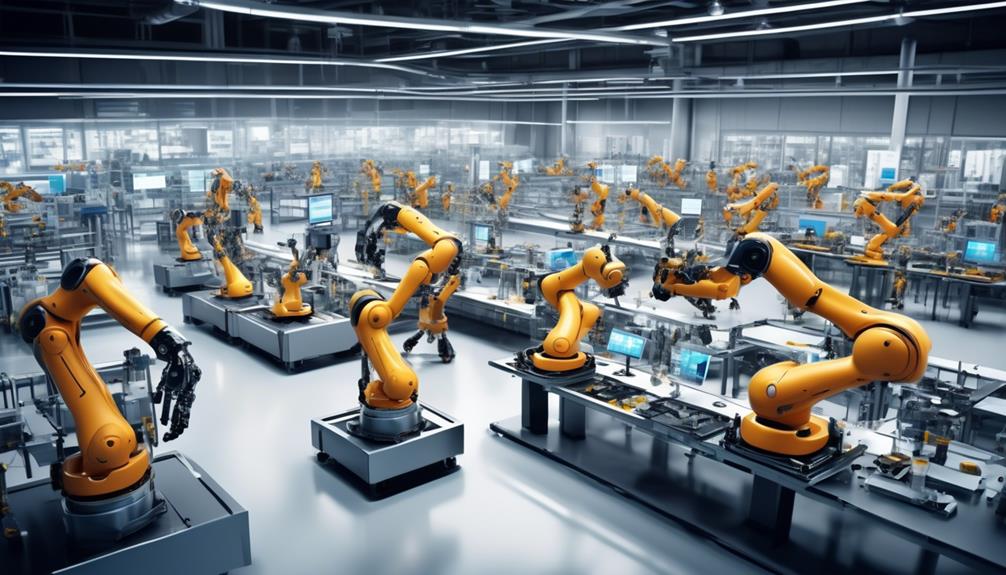
Transitioning from the discussion of key components of automation, our focus now shifts to the tangible benefits that automated quality control systems bring to the manufacturing sector.
Improved Quality:
Automated quality control systems enhance inspection accuracy and speed, leading to reduced errors and real-time defect detection. This results in higher product quality and increased customer satisfaction.
High Throughput Production:
These systems enable high throughput production by efficiently identifying and addressing defects in real-time, minimizing production interruptions, and maximizing output.
Comprehensive Compliance Tests:
Automated quality control solutions conduct comprehensive compliance tests, ensuring that products meet regulatory standards. This proactive approach not only enhances product quality but also facilitates seamless adherence to industry regulations.
Automated quality control systems play a crucial role in improving manufacturing processes. They not only elevate the overall quality of products but also contribute to high throughput production and ensure comprehensive compliance with industry standards. These benefits are essential for manufacturers looking to enhance their competitiveness and meet the demands of an increasingly quality-conscious market.
Implementation in Processes
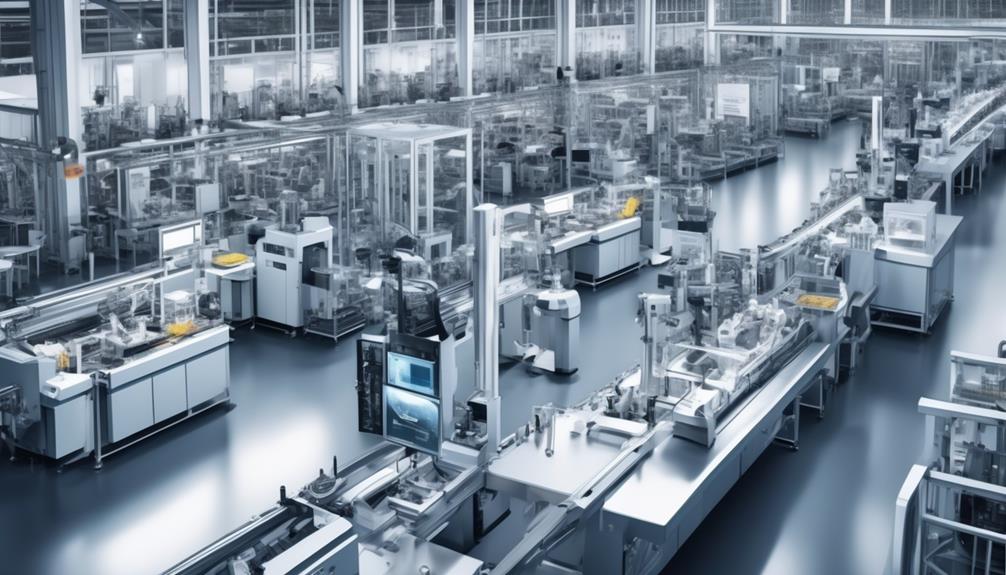
Incorporating automated quality control processes into existing manufacturing systems requires meticulous planning and strategic integration to ensure seamless operation and maximum efficiency.
When implementing automated quality control inspections, manufacturers can make better use of advanced measurement technologies and real-time monitoring to improve the quality of their products.
It's essential to establish best practices for automated quality control, such as selecting the right partners, like robot integrators, and conducting thorough financial analysis and technology evaluations to validate the performance and viability of automation in quality control.
By doing so, manufacturers can detect issues before they become critical, reduce costs, and enhance overall product quality.
Successful implementation of automated quality control measures is pivotal for the seamless transition and integration with existing systems in manufacturing processes, ensuring real-time monitoring and issue resolution.
This meticulous approach to implementation is crucial for maximizing the benefits of automated quality control solutions and maintaining a competitive edge in the manufacturing industry.
Overcoming Challenges
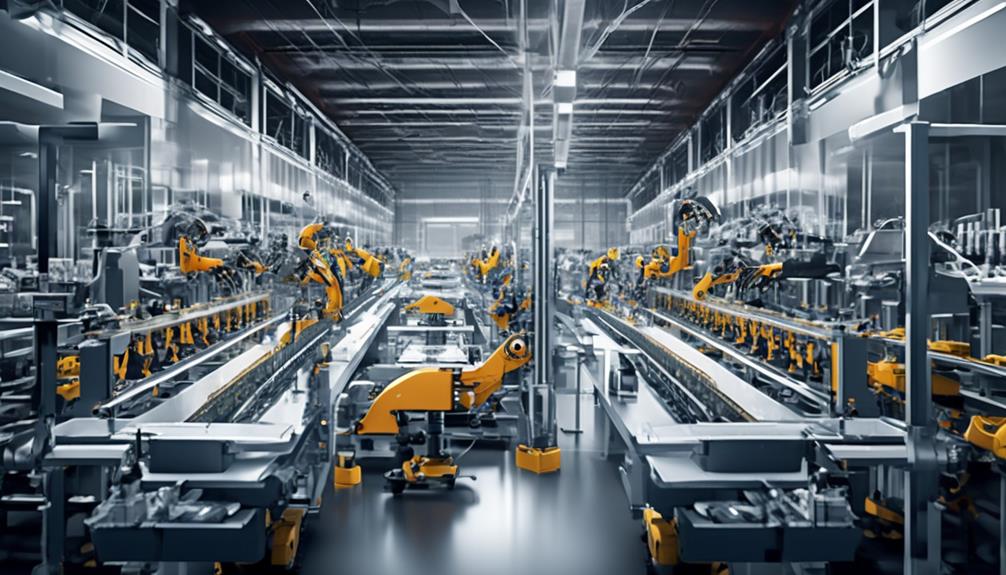
Addressing the challenges associated with implementing automated quality control solutions requires careful planning and proactive problem-solving to ensure successful integration with existing manufacturing processes. Manufacturers must overcome several obstacles to capitalize on the benefits of automated quality control inspections.
- Overcoming initial investment challenges: Allocating resources for the implementation of automated quality control solutions can be a daunting task. Manufacturers need to carefully assess their budget and prioritize investments to ensure a smooth integration process.
- Training and adaptation of personnel: Educating and preparing employees to operate and manage automated quality control technologies is crucial. Providing comprehensive training programs and continuous support can help employees embrace the new technology and utilize it effectively.
- Addressing misconceptions and concerns: There may be resistance from employees and customers due to misconceptions about the role of automation in quality control. Clear communication and education about the benefits of automated quality control in ensuring production quality are essential for overcoming these concerns and gaining acceptance.
Industry Applications
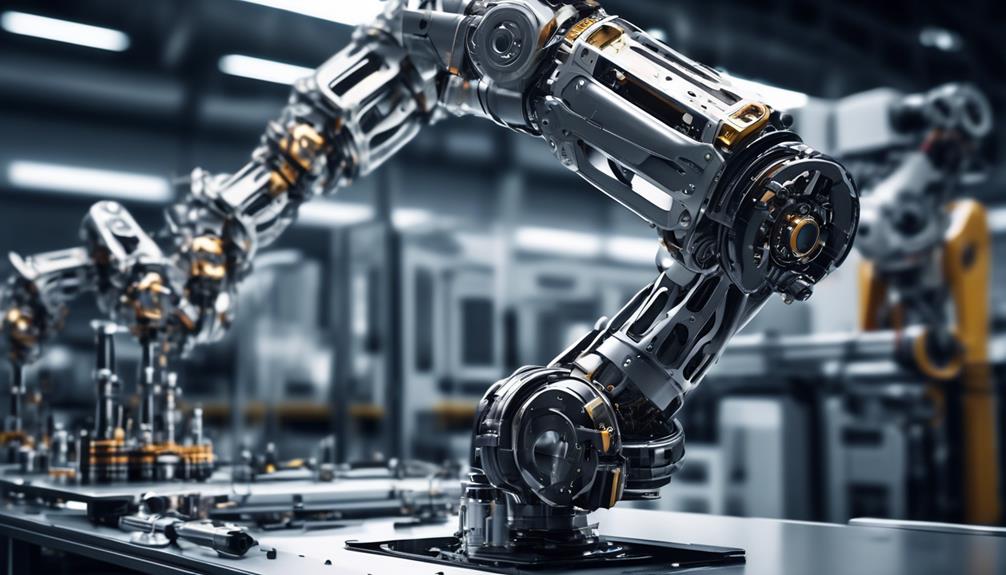
Automated quality control solutions are revolutionizing various industries, ensuring precision, reliability, and compliance with stringent standards. Manufacturers across the automotive sector benefit from automated inspection systems, enhancing production quality while reducing defects. In the electronics industry, these solutions bring precision and reliability to intricate components, crucial for maintaining high-quality standards. Pharmaceutical manufacturing companies rely on automated quality control to uphold the highest standards of quality and accuracy, ensuring compliance with regulations. In the food and beverage sector, these systems improve quality, reduce errors, and enhance efficiency in production processes. Aerospace industry applications of automated quality control solutions are critical for maintaining strict quality standards and safety measures. The table below further illustrates the diverse industry applications of automated quality control solutions.
| Industry | Benefits | Key Features |
|---|---|---|
| Automotive | Safety, reliability, reduced defects | Automated inspection systems |
| Electronics | Precision, reliability | Metrology software |
| Pharmaceuticals | Compliance, accuracy, high standards | Quality control systems |
| Food & Beverage | Quality improvement, reduced errors, efficiency | Production quality enhancement |
These applications demonstrate the versatility and impact of automated quality control solutions across diverse industry sectors.
Future Trends
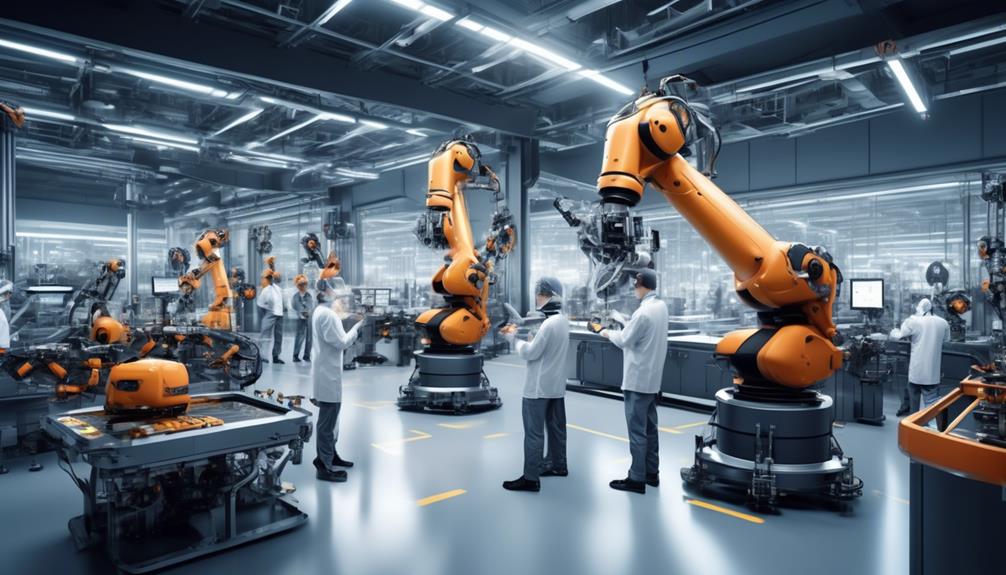
In the coming years, we anticipate significant advancements in automated quality control systems. AI-driven quality control holds the promise of more intelligent and adaptive processes, optimizing efficiency and accuracy.
Integration with IoT and predictive maintenance will further revolutionize manufacturing quality control, ensuring proactive measures to prevent defects and enhance overall productivity.
Ai-Driven Quality Control
How will the integration of AI and machine learning revolutionize the future of quality control in manufacturing?
- Enhanced Efficiency: AI-driven quality control will significantly improve the inspection process by swiftly analyzing vast amounts of data, identifying defects, and predicting potential issues, thereby streamlining production processes.
- Improved Accuracy: Advanced technologies will enable more precise and detailed quality assessments, reducing the margin of error and ensuring that only products meeting the highest standards are released.
- Adaptive Problem-Solving: AI-driven quality control systems will continuously learn and adapt, recognizing patterns and anomalies, ultimately leading to proactive maintenance and the prevention of defects, thereby revolutionizing the manufacturing industry.
This integration holds immense potential for elevating the standards of quality control in manufacturing, ultimately leading to improved efficiency, accuracy, and adaptive problem-solving.
Iot Integration
The future of quality control in manufacturing will see a significant shift with the integration of IoT, as it promises to revolutionize the way data is collected and utilized for ensuring product quality. With IoT integration, manufacturers can enhance automated quality control systems to capture and analyze data from large quantities of parts in real time. This enables proactive identification of defects and potential issues, leading to improved efficiency and reduced waste. The table below illustrates the potential impact of IoT integration on automated quality control solutions in manufacturing.
| Benefits of IoT Integration in Automated Quality Control |
|---|
| Enhanced real-time data collection and analysis |
| Proactive identification of defects and potential issues |
| Improved efficiency and reduced waste |
| Facilitates predictive maintenance and optimization |
Predictive Maintenance
Advancements in technology are shaping the future of predictive maintenance, enhancing the intelligence and efficiency of automated quality control systems. Manufacturers are witnessing a shift towards predictive maintenance due to its ability to provide reliable results and optimize maintenance schedules.
The integration of AI and Machine Learning is anticipated to revolutionize predictive maintenance, enabling automated systems to predict equipment failures accurately. This evolution will empower manufacturers to conduct proactive maintenance, reducing downtime and optimizing resources.
Furthermore, predictive maintenance is expected to redefine roles within the manufacturing industry, creating new job opportunities in technology and maintenance.
As predictive maintenance becomes more prevalent, ethical considerations regarding job displacement and the need for human oversight in automated quality control solutions are gaining prominence, emphasizing the importance of responsible implementation.
Impact on Employment
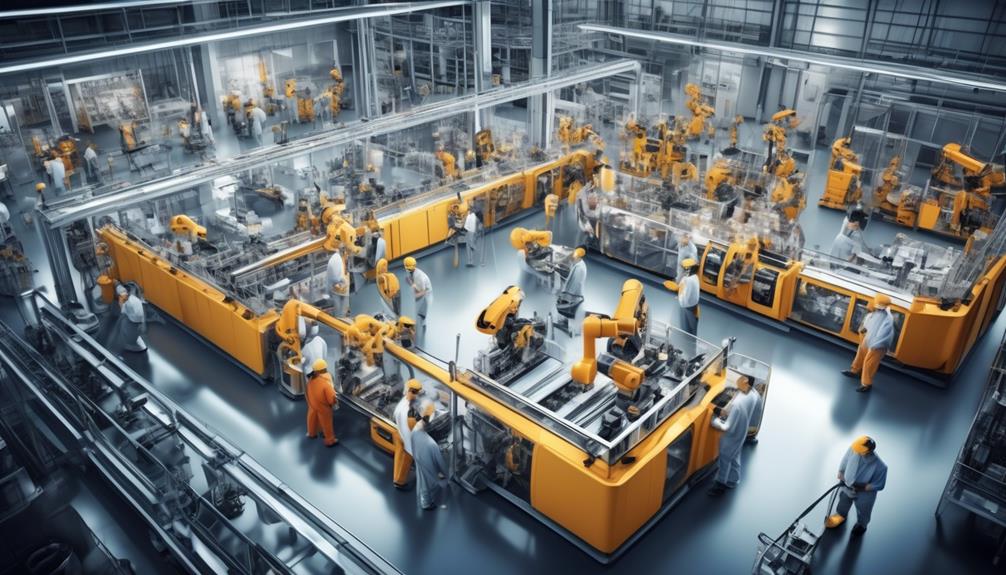
With the integration of automated quality control solutions in manufacturing, the impact on employment is evident through the evolution of job roles and the creation of new opportunities in the technology and maintenance sectors. As automated quality control systems become more prevalent, the roles of employees within manufacturing companies are being redefined, leading to the creation of new job opportunities. The following table provides a concise overview of the impact on employment due to the implementation of automated quality control solutions:
| Impact on Employment | Description |
|---|---|
| Job Evolution | Traditional manufacturing roles are evolving, requiring employees to adapt to new technology and processes. |
| Job Creation | The integration of automated quality control systems is creating new employment opportunities in technology and maintenance sectors. |
| Skill Development | Employees are required to develop new skills to operate and maintain automated quality control systems, driving continuous learning. |
| Addressing Production Bottlenecks | Automation can address production bottlenecks, leading to more efficient processes and potentially higher job demand in certain areas. |
| Shift in Job Focus | While some traditional roles may diminish, there is a shift towards higher-skilled positions focusing on technology implementation and maintenance. |
The impact of automated quality control solutions extends beyond merely replacing human labor. It is reshaping the employment landscape within manufacturing, presenting new opportunities and driving the need for upskilling and reskilling among employees.
Regulatory Compliance
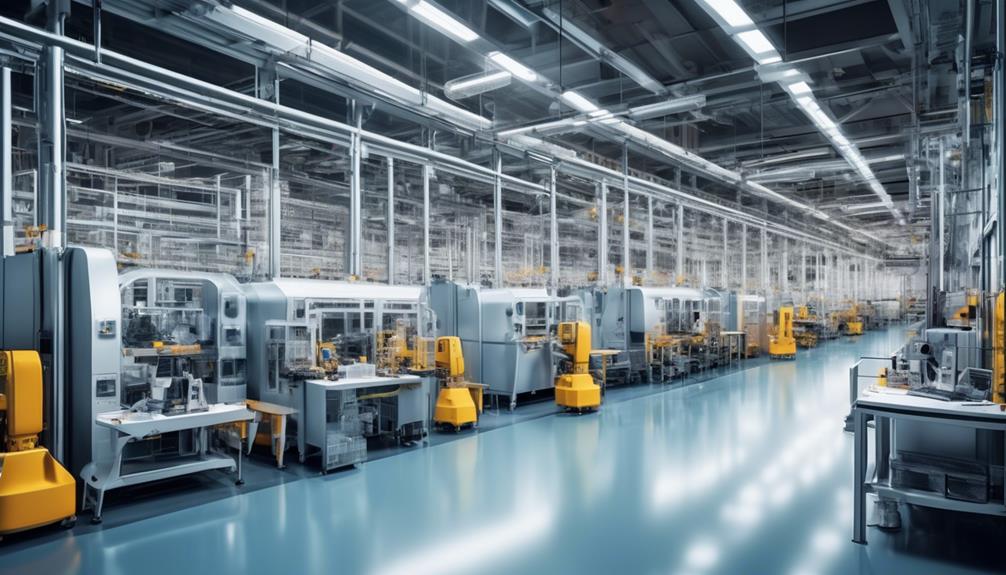
Ensuring compliance with regulatory standards requires a comprehensive approach encompassing quality, safety, and environmental regulations in manufacturing. Automated quality control solutions play a pivotal role in helping manufacturers maintain regulatory compliance.
Here are three crucial aspects of regulatory compliance in manufacturing:
- Sophisticated Reporting: Automated quality control systems provide manufacturers with detailed and real-time reports on the quality and safety of their products. These sophisticated reporting capabilities enable swift identification and rectification of any non-compliance issues, ensuring that products meet regulatory standards.
- Inspection Efficiency: Automated quality control solutions streamline the inspection process, enhancing its efficiency and accuracy. By automating inspection tasks, manufacturers can ensure that every product meets the necessary regulatory requirements, leading to improved compliance and reduced risk of non-conformities.
- Adherence to Standards: Regulatory compliance necessitates adherence to specific quality and safety standards. Automated quality control systems assist manufacturers in consistently meeting these standards, ensuring that products are safe for consumer use and comply with all relevant regulations.
Incorporating automated quality control solutions into manufacturing processes is essential for maintaining regulatory compliance, as it enables manufacturers to uphold stringent quality, safety, and environmental standards efficiently and effectively.
Environmental Impact

Automated quality control systems actively contribute to reducing waste and promoting energy efficiency, aligning with sustainability goals in manufacturing.
The implementation of automated quality control processes not only enhances product quality but also leads to energy savings and reduces the environmental impact. By leveraging automated quality control solutions, manufacturers can identify and rectify defects early in the production process, thus minimizing waste generation.
Real-time monitoring and proactive quality control measures enabled by these systems play a crucial role in minimizing environmental impact. Manufacturers can significantly reduce their environmental footprint by integrating automated quality control systems, as these solutions contribute to energy savings and waste reduction.
The use of automated quality control solutions also ensures that control operations are optimized, leading to efficient use of resources and reduced environmental impact. Additionally, the data obtained through automated inspection and quality control processes can be utilized to further refine manufacturing processes, making them more environmentally friendly.
Frequently Asked Questions
How Can Quality Control Be Improved in Production?
We improve quality control in production through enhanced accuracy, reduced errors, real-time monitoring, and proactive measures.
By implementing automated solutions, we achieve timely interventions and corrective actions, ultimately enhancing overall efficiency and product quality.
This approach ensures that our manufacturing processes operate with optimal precision and reliability, meeting the highest standards.
How Can We Improve Automation and Quality of the Product?
To improve automation and product quality, we need to implement cutting-edge technology and seamless integration.
By leveraging automated quality control solutions, we can achieve unparalleled precision and efficiency. Real-time monitoring and defect detection are pivotal for ensuring impeccable product quality.
Overcoming challenges through initial investment and addressing misconceptions is crucial.
What Is Automated Quality Control?
Automated quality control streamlines manufacturing processes by employing cutting-edge technology to inspect and assess product quality. This approach ensures unparalleled precision and efficiency, meeting and exceeding customer expectations.
Our hardware and software, including sensors, cameras, machine learning algorithms, and data analytics tools, are pivotal in achieving these results.
This system is pivotal in maintaining high product standards and driving focus on quality.
How the Automated System Will Improve the Quality of the Data?
We believe automated systems significantly improve data quality. Real-time monitoring reduces the time between defect identification and rectification, enhancing data integrity.
Automated inspections eliminate human error, providing comprehensive and accurate data. The integration of AI and machine learning allows for advanced data analysis, leading to improved decision-making.
Automated quality control systems ensure complete product traceability, enhancing data accuracy. Automation tools provide dynamic, real-time reviews of production quality, enabling proactive measures to improve data quality.
Conclusion
In conclusion, automated quality control solutions are revolutionizing the manufacturing industry by ensuring impeccable product quality and efficiency.
According to a recent study, companies that implement automated quality control see a 90% reduction in defects and a 50% increase in production output.
With the integration of advanced technology and proactive measures, manufacturers can stay ahead of the competition and meet the demands of a rapidly evolving market.
